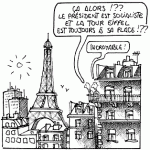Arriving in France can be overwhelming and many Americans find themselves in a bit of a culture shock. If you’re preparing your first trip to France and haven’t already experienced its delights for an extended stay, here are a few quick tips to help you through the first few days….even the first couple of weeks. Give yourself some time before making snap judgments; you’ll be surprised at how quickly the experiences out of your comfort zone can make you either want to run back home or run forward.
France Arrival Survival Guide
Rest up
Jet lag is a huge consumer of energy. Be sure you rest properly before your trip, or as soon after arrival as you possibly can. The Louvre will still be there after your nap!
The world outside your comfort zone
Even something as small as shopping at the local supermarket can feel strange, although exhiliarating. Oh my goodness, all that cheese! And the cuts of meat are different. And how do these shopping carts work—why are they all attached together? Allow yourself some time to adjust. Enjoy what you’re seeing. Don’t be afraid to ask questions of other shoppers or personnel. Precede your questions in English with “Excusez-moi, parlez-vous anglais?”
Establish a new routine
Opening and closing times, and particularly meal times, are different in France from the US. Read about dining habits in France if you can before you leave, in order to fit them appropriately into your new schedule. For example, if you plan to eat a midday meal, be mindful that most French restaurants serve lunch from 12-2:30, period. Dinner doesn’t start until 7:30 pm. The only diners you’ll see in the restaurants at 6:30 are Americans. Sundays are sacred in France. No stores are open; brace yourselves for a shopping-free day.
Mind your manners
The French have an intricate system of manners and politeness, instilled in them at a very young age. Visitors to France often inadvertently “break the rules” because they’re unwritten and different from one’s own culture. For example, the French begin each and every verbal interaction with “Bonjour.” If you’re asking your way, you can start by saying Bonjour, to indicate that the conversation is open. And always end, with “Merci. Au revoir.” Other rules of politeness: always excuse yourself (“Pardon”) when you pass in front of someone else, particularly through a doorway; wait until everyone is served their food before beginning to eat your meal; if you’d like more wine (or water or whatever the beverage is), always serve others before you serve yourself; always address the shopkeeper of any store you walk into with “Bonjour Madame/Monsieur” and “Au revoir, Madame/Monsieur.” You’ll be appreciated for being a polite foreigner!
Suspend judgement
There is more than one path to the truth. Each civilization and culture has its own reason to what is perceived as madness. Allow yourself to observe without judgment in your initial dealings with the French. You might find that you even prefer their way of doing this or that, but allowing for their differences will be less stressful. Learn something about their politics and their way of life; you might even enjoy reading their newspapers or their political cartoons.
Remember the folks back home….but just send a postcard.
In today’s world of interconnectedness, it’s almost impossible to stay away from one’s computer or phone to communicate with your loved ones back home. Remember, however, that you’re in a different routine and environment, and allowing yourself to fully experience it without the interference of the homeland enables you to adjust more quickly.
Get organized!
Write down everything you’d like to do while you’re in France and then plan carefully. Sometimes just figuring out how to get somewhere can take up immense amounts of time. Spend time in the beginning of your trip to make up your wish-list of activities and must-see’s. Make sure what you want to visit is open on that day; check the opening and closing times. Spend time learning the metro system or the road signs if you’re driving. You’ll be able to do what you want to do with a little foresight and planning.
